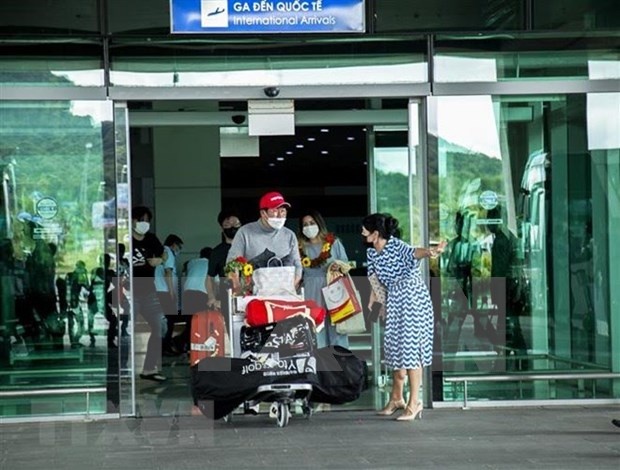Vietnam drops COVID-19 vaccine certificates, quarantine requirements for foreign arrivals
 |
| Foreign visitors arrive in Phu Quoc (Photo: VNA) |
Hanoi - The Ministry of Health has officially issued the long-awaited COVID-19 protocols for foreign arrivals in Vietnam.
The regulations state that visitors with negative COVID tests can enjoy quarantine-free travel from day one.
Travellers entering Vietnam via air routes will have to present proof of negative SARS-CoV-2 tests (except for children under two years old) done within 72 hours prior to departure in cases of RT-PCR/RT-LAMP or within 24 hours in cases of rapid antigen tests, and the results must be certified by the authorities of the country where the tests are conducted.
People entering via road, sea, and rail will be subject to the same requirements.
If arrivals cannot show proof of negative tests, they are required to take a test (either using RT-PCR/RT-LAMP method or rapid antigen tests) in the first 24 hours from the time of arrival.
If the results are negative, they may travel outside of their place of accommodation, with public health measures still in place, if the results are positive, they must notify health authorities for further instructions.
Children under two years old are not required to take COVID-19 tests, and they can still enter Vietnam and take part in activities outside of the place of accommodation with their parents or relatives even if they have not been vaccinated against COVID-19 or contracted the virus before.
Arrivals must make medical declaration before entering and use Vietnam’s COVID-19 mobile application (PC-COVID, available on both iOS and Android) during their entire stay according to regulations.
At the border gate, if one shows symptoms of SARS-CoV-2 infection (fever; cough; sore throat; runny nose, stuffy nose; body aches, fatigue, chills; reduced or loss of taste; reduced or loss of sense of smell; headache; diarrhoea; breathing difficulties; respiratory infection, etc.), they must immediately notify the health agency at the border gate to take medical measures as regulated.
No mandatory quarantine is required, but in the first 10 days after entry, people should self-monitor their health and if any symptoms develop, ask for assistance from the nearest medical facilities.
Visitors are asked to frequently wear masks and disinfect their hands.
People without negative COVID-19 results prior to entry are asked to not make rest stops and make contact with other people along the way from the border gate to their place of accommodation.
Some prominent omissions in the latest official set of COVID-19 rules is that there is no longer a requirement for the COVID-19 vaccination or recent recovery certificates, multiple tests required before and after entry, or the need to comply with restrictions like avoiding gathering or keeping safe distance, like in previous proposed plans from the ministry.
The guidelines, released the day after the country fully reopened international tourism activities and reinstated pre-pandemic entry and exit regulations, replace all other previous COVID-19 rules for foreign entries and the health ministry asks local authorities and State agencies to quickly direct the implementation of the COVID rules to avoid spreading the virus among the travellers and the community.
It is hoped the relaxed regulations will ease concerns from international tour companies who have been desperate to welcome back foreign tourists into the country after two years of severe disruptions caused by the pandemic.
With these new COVID-19 guidelines, international visitors entering Vietnam will be “treated the same way” as domestic visitors, as Deputy Prime Minister Vu Duc Dam has promised late March 15.
The Ministry of Health also noted that the new daily COVID-19 increases in Vietnam remains significant and Omicron variant has been circulating in the community, however, with one of the highest vaccination rates in the world, hospitalisations and deaths from the virus remain at manageable levels, and the guidelines are part of the efforts to safely adapt to, and flexibly and effectively control COVID-19.
What the stars mean:
★ Poor ★ ★ Promising ★★★ Good ★★★★ Very good ★★★★★ Exceptional
Related Contents
Latest News
More News
- Protect what’s next: towards a future free from meningococcal group B disease (December 05, 2025 | 18:00)
- New ILO report offers policy recommendations for disability inclusion (December 04, 2025 | 15:18)
- Maternal job loss may affect children’s mental health, research shows (December 03, 2025 | 19:11)
- Women lead Vietnam’s shift to climate-resilient agriculture (December 03, 2025 | 19:10)
- Experts highlight unpaid care work as key barrier to gender equality (December 03, 2025 | 15:15)
- Opportunities and inequalities for women workers in Vietnam's garment industry (December 03, 2025 | 09:00)
- Vietjet flights carry love to devastated central region (November 28, 2025 | 11:35)
- New initiative to boost the fight against domestic violence (November 26, 2025 | 10:00)
- South Korea funds IOM relief for Vietnam’s typhoon-affected communities (November 24, 2025 | 15:33)
- AI and human-centred values set to shape the future of HR in Vietnam (November 21, 2025 | 18:04)

 Tag:
Tag:





















 Mobile Version
Mobile Version